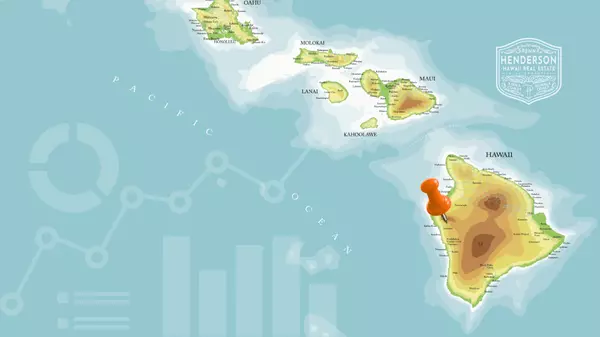How to Sell Smarter, with Confidence.
I do more than simply list your home; I position it to sell faster, for more, and with a level of professionalism that reflects the value of your property. Backed by deep local Big Island expertise, data-driven insights, and cutting-edge marketing, I deliver the highest level of service throughout the entire sales process.
Whether you’re selling a luxury estate, an investment condo, or a cherished family home, my proven 7-step listing strategy is designed to maximize your return and minimize the stress of selling.
❂ Specializing in Kona & Kohala Coast properties, including Waimea and Waikoloa Village.
$315M
Total Brokerage Sales
- $18M
Penn's 2024 Sales
- $1.7M
Average Sales Price
32+
★★★★★ Ratings
Why Sellers Choose to
Work with Penn
❂ Top Producer with Proven Results
❂ 20+ Years Big Island Local Expertise
❂ Clear & Responsive Communication
❂ Relentless Client Advocacy
7 Critical Steps to Selling Your Home for More $

1. Robust Market Analysis
I go beyond a basic CMA with a strategic pricing and launch plan tailored to current market conditions. By analyzing recent sales, active listings, inventory trends, and buyer demand in your area, we position your home for maximum visibility and stronger offers from the start. The result is a confident launch that captures attention and builds early momentum.

2. Polished to Perform
First impressions are everything. That’s why we start with a comprehensive home evaluation to identify opportunities for improvement. Whether it’s light staging, repairs, landscaping, or professional photography, we craft a pre-listing plan tailored to highlight your home’s most valuable features, ensuring it stands out.

3. Elevated Marketing
Marketing isn’t just a flyer or a few photos on MLS, it’s a carefully crafted story. My approach blends luxury branding, emotional storytelling, high-end visuals, and multimedia content to enhance the perceived value of your home. From cinematic video tours to immersive 3D walkthroughs, we push the boundaries of traditional real estate marketing.

4. Maximum Exposure
I leverage the most powerful digital platforms, print publications, social media, and global syndication networks to put your home in front of the right audience, both locally, nationally, and internationally. With my wide-reaching exposure strategy, we leave no stone unturned in getting your home seen.

5. Buyer Engagement
My proactive approach to generating buyer interest includes targeted online advertising, database outreach, CRM-driven follow-up systems, and direct engagement with qualified leads. I don’t wait for buyers to find your home - I go out and find the buyers, creating increased interest and competition.

6. Calculated Negotiation
We begin preparing for negotiations well before your home is ever listed. Harnessing decades of our team's expertise, we apply tactical negotiation techniques to position you with maximum leverage - from initial listing price strategy to handling multiple-offer situations and final contract terms.

7. Operational Excellence
Selling a home involves many moving parts, and success hinges on effective execution. I’ve assembled a proven network of first-class professionals, including trusted escrow officers, contractors, cleaners, photographers, and more. By coordinating every detail personally and working with only the best in the industry, I ensure a smooth and efficient process from listing to closing - so you can move forward with confidence.

► Big Island Seller's Guide
This comprehensive resource is filled with invaluable tips on researching, preparing, and marketing your home to ensure a quick sale at the highest price with minimal stress and expense. Inside, you'll discover expert advice on how to price your property effectively, promote it to the right audience, navigate tax considerations, understand Hawaii's unique escrow process, and master the listing and selling process.
Selling Real Estate in Hawaii
HARPTA stands for the Hawaii Real Property Tax Act, a state law that requires withholding of 7.25% of the gross sales price when a non-resident sells real estate in Hawaii. It is not a tax itself, but a withholding mechanism to ensure the seller pays any Hawaii capital gains taxes that may be owed.
Who Does HARPTA Apply To?
- HARPTA applies to non-resident sellers of Hawaii real estate.
- This includes U.S. mainland residents, foreign nationals, and even former Hawaii residents who no longer claim Hawaii as their primary place of residence.
- If you are a Hawaii resident, you are exempt; however, you must sign a declaration of residency during the escrow process.
How It Affects Sellers:
- At closing, 7.25% of the sales price is withheld and submitted to the Hawaii Department of Taxation.
- The amount withheld is based on gross sale price, not net proceeds or profit.
- If you don’t owe that much in actual taxes (or any at all), you must file a Hawaii state tax return to claim a refund.
Can You Avoid HARPTA Withholding?
Yes—in certain situations, sellers may apply for a HARPTA Withholding Certificate (Form N-288B) prior to closing to request a reduced withholding amount or full exemption. Approval is not guaranteed, and timing is critical, so apply early if you think you may qualify.
Common Situations That Trigger HARPTA:
- You live on the mainland and are selling a Hawaii vacation home
- You inherited a Hawaii property, but you live outside the state
- You moved out of Hawaii and are selling your former residence
Key Takeaways for Sellers:
- HARPTA is a withholding, not an additional tax
- Planning ahead can help you minimize or avoid delays in receiving net proceeds
- Work closely with your real estate agent, escrow officer, and CPA to determine if HARPTA applies and to ensure withholding is managed correctly.
Helpful Resources:
- Hawaii Department of Taxation – HARPTA Info
- HARPTA Filing Forms (N-288 Series)
- Contact Penn for guidance and referrals to trusted tax professionals.
FIRPTA and HARPTA are both tax withholding laws that may affect sellers of real estate in Hawaii, but they are separate laws governed by different jurisdictions.
HARPTA: Hawaii Real Property Tax Act
- State-level withholding
- Applies to non-residents of Hawaii (including U.S. citizens who live on the mainland)
- Requires 7.25% of the gross sales price to be withheld at closing
- Funds are submitted to the Hawaii Department of Taxation
FIRPTA: Foreign Investment in Real Property Tax Act
- Federal-level withholding
- Applies only to foreign (non-U.S.) sellers of U.S. real estate
- Requires 15% of the gross sales price to be withheld
- Funds are submitted to the Internal Revenue Service (IRS)
Can Both Apply?
Yes. If the seller is both a non-resident of Hawaii and a foreign national, both FIRPTA and HARPTA may apply, resulting in a combined withholding of 22.25% of the gross sales price at closing.
Planning Ahead:
- Sellers can apply for exemptions or reductions under both FIRPTA and HARPTA by submitting appropriate forms prior to closing.
- Work with a qualified CPA or tax advisor to explore options and file necessary documents.
- Real estate agents and escrow officers in Hawaii are familiar with both laws and can help coordinate the process.
Helpful Resources:
- HARPTA Overview – Hawaii Dept. of Taxation
- FIRPTA Withholding Overview – IRS
- Contact Penn to understand how these laws may affect your sale and connect with local tax professionals.
No, you don't need to be physically present on the island to sell your home in Hawaii. Many property owners—particularly those who are second-homeowners, investors, or former residents—complete the entire sales process remotely with the assistance of an experienced local real estate agent and an escrow team.
How Off-Island Home Sales Work:
- Virtual Consultations: Your listing agent can handle everything from listing preparation and pricing strategy to photography, marketing, and showings, all without requiring your presence.
- Document Signing: Listing agreements and disclosure forms can be signed electronically via secure platforms (e.g., DocuSign).
- For final closing documents, you may need to have certain forms notarized in person near your home or at a U.S. embassy if you’re overseas.
- Remote Closing: Escrow companies in Hawaii are well-equipped to facilitate remote closings, coordinating with out-of-state or international sellers to ensure seamless transactions. Final proceeds can be wired to your designated bank account.
- Property Prep & Management: If repairs, cleaning, staging, or maintenance are needed, your agent can arrange and oversee local vendors on your behalf.
- Key Exchange & Access: Lockboxes or smart keypads are used to allow access for showings, inspections, and appraisals. You won't need to handle logistics directly.
Additional Notes:
- If you’re a non-resident of Hawaii, HARPTA tax withholding may apply (see related FAQ).
- Allow extra time for shipping of notarized documents if you're abroad.
Seller Tip:
Choose a local listing agent with experience working with off-island clients. They’ll act as your eyes and ears on the ground, keeping the process smooth, transparent, and efficient.
Helpful Resources:
- Complete Seller’s Guide – Selling Your Home in Hawaii
- HARPTA Info for Off-Island Sellers
- Contact Penn to discuss your property and next steps for selling remotely.
When selling property in Hawaii, you’ll need to provide a combination of mandatory disclosures, legal documents, and property-specific records. These documents ensure transparency, protect both parties, and facilitate a smooth sale process through the use of escrow.
Required Seller Documents in Hawaii:
- 1.) Listing Agreement
- *Authorizes your real estate agent to represent you and market your property.
- 2.) Real Property Disclosure Statement (Sellers' Disclosure)
- *Mandatory by law in Hawaii (HRS §508D).
- *Details the known condition of the property, including physical defects, past repairs, and environmental issues.
- *Must be delivered to the buyer within 10 days of escrow opening, unless waived.
- 3.) Inventory List (if applicable)
- *For furnished properties, sellers often provide a detailed inventory list of included items (e.g., furniture, appliances, décor).
- 4.) Condominium Documents (if applicable)
- *Includes House Rules, Declaration, Bylaws, Financials, and Meeting Minutes.
- *Provided by the HOA or property management company and shared with the buyer during escrow.
- 5.) Preliminary Title Report
- *Ordered through escrow; sellers are expected to review and confirm any liens, easements, or encumbrances on record.
- 6.) Survey or Staking Report (optional but common for single-family homes)
- *May be requested to confirm boundary lines, encroachments, or easements.
- 7.) Rental Agreements (if tenant-occupied)
- *Any active lease agreements must be disclosed and provided to the buyer.
- 8.) Past Permits and Plans (if available)
- *While not required, any documents related to past improvements, permits, or plans can support transparency and help the transaction.
- 9.) Foreign/Non-Resident Withholding Forms (HARPTA/FIRPTA)
- *Required for non-resident or foreign sellers. Forms include N-289 (HARPTA declaration), N-288C (exemption), or IRS Form 8288 (FIRPTA).
- 10.) Final Closing Documents
- *Escrow will coordinate the signing of conveyance documents, settlement statements, and notarized affidavits shortly before closing.
Helpful Resources:
- Hawaii Sellers Disclosure Law – HRS §508D
- Seller’s Guide: How to Prepare Your Home for Market
- Contact Penn to get a customized checklist for your property sale.
Staging your home before listing is highly recommended, especially in Hawaii’s competitive real estate market. A well-staged property can make a powerful first impression, help buyers visualize the space, and often lead to faster sales and higher offers.
Benefits of Staging:
- Maximizes Visual Appeal: Staging highlights your home’s strengths, minimizes distractions, and creates a warm, welcoming atmosphere—both in person and in listing photos.
- Helps Buyers Emotionally Connect: Most buyers struggle to picture themselves in an empty or overly personalized space. Staging allows them to better envision the lifestyle your home offers.
- Boosts Online Presence: Nearly all buyers start their search online. Professionally staged homes typically yield stronger photography and video content, resulting in increased clicks and higher activity levels.
- Can Lead to Higher Sale Prices: According to national data, staged homes tend to sell faster and for a higher price compared to non-staged homes.
Staging Options in Hawaii:
- Professional Home Staging: Especially effective for vacant homes, luxury properties, or condos in resort markets.
- Occupied Home Staging: Involves using your existing furniture, with guidance from a stager or agent on decluttering, depersonalizing, and rearranging.
- Virtual Staging: A cost-effective option for digitally enhancing listing photos, especially in vacant units or pre-construction sales.
When Staging May Not Be Necessary:
- If the home is a tear-down, fixer-upper, or priced primarily for land value.
- If the property is already well-maintained, minimalistic, and market-ready, with high-end finishes and neutral décor.
Seller Tip:
Even basic improvements—such as cleaning, touch-up paint, removing clutter, and fresh landscaping—can go a long way. Your agent can help determine the best staging approach for your specific property.
Helpful Resources:
- Guide to Prepping Your Home for Sale in Hawaii
- Contact Penn for staging recommendations or a complimentary walkthrough.
Pricing your home correctly in today’s market is critical to attracting qualified buyers, generating strong offers, and avoiding extended time on the market. In Hawaii, where property values can vary significantly based on location, views, zoning, and condition, it's especially important to rely on local market expertise and data-driven analysis.
Key Steps to Pricing Your Home:
- Local Comparative Market Analysis (CMA):
A CMA evaluates recently sold properties, active listings, and expired listings in your area that are comparable in size, condition, and location. This is the foundation for establishing fair market value. - Account for Market Conditions:
Current trends, including inventory levels, buyer demand, interest rates, and seasonal fluctuations, can all impact pricing strategies. For example, homes may sell more quickly (or command higher offers) in peak buying seasons or low-inventory environments. - Adjust for Unique Features:
Not all homes are created equal. Views, updated interiors, pool installations, solar panels, short-term vacation rental (STVR) permits, or acreage can significantly impact a home's market value on the Big Island. - Know Your Buyer Pool:
Understanding who is likely to buy your home—whether full-time residents, second-home seekers, or investors—can help fine-tune pricing for maximum appeal. - Avoid Overpricing:
While it may be tempting to “test the market,” pricing too high often results in fewer showings, prolonged days on market, and eventual price reductions, weakening your negotiating position. - Monitor Market Feedback:
Once listed, it’s essential to track buyer activity, including feedback and online engagement. Adjustments can be made quickly as needed, based on the home's performance.
Hawaii-Specific Considerations:
- Coastal and ocean view properties may command premium pricing, but micro-market data is key.
- Lava zones, leasehold status, or short-term rental eligibility can significantly impact value.
- Certain neighborhoods or subdivisions have a wider range of pricing depending on build quality, lot size, and age of construction.
Helpful Resources:
- Get a Custom Home Valuation from Penn
- Just Sold Listings – Big Island Market Data
- Contact Penn to request a personalized pricing analysis based on current market trends in the Big Island.
Yes. When you sell real estate in Hawaii, you may be subject to capital gains tax at both the federal and state levels. The total amount you owe depends on your residency, how long you owned the property, and whether the property was your primary residence.
1. Hawaii State Capital Gains Tax
- Hawaii taxes capital gains as ordinary income, but at a flat rate of 7.25%.
- This applies whether or not you live in Hawaii, unless the gain qualifies for an exclusion.
2. Federal Capital Gains Tax
- The IRS taxes capital gains based on how long you held the property:
- Short-term capital gains (held for one year or less) are taxed at your ordinary income tax rate.
- Long-term capital gains (held more than one year) are taxed at 0%, 15%, or 20%, depending on your taxable income.
- These taxes apply regardless of the property’s location.
3. Primary Residence Exclusion
If the property was your primary residence for at least 2 out of the last 5 years, you may qualify to exclude up to $250,000 of gain ($500,000 for married couples filing jointly) from federal taxes. Hawaii generally follows this rule for state taxes as well.
4. HARPTA Withholding (for Non-Residents)
If you are not a Hawaii resident, the state requires HARPTA withholding of 7.25% of the gross sales price at closing. This is not an additional tax, but a prepayment toward your Hawaii tax liability. You’ll need to file a Hawaii state tax return after the sale to calculate the actual tax owed and potentially receive a refund.
Summary for Sellers:
- Most sellers will owe capital gains tax if they sell for more than they originally paid (minus improvements and closing costs).
- If the property was your primary residence, you may qualify for an exemption.
- Non-residents should plan ahead for HARPTA withholding at closing.
- Consult with a CPA to determine your actual capital gains exposure and filing requirements.
Helpful Resources:
- HARPTA Withholding – Hawaii Dept. of Taxation
- IRS – Exclusion of Gain on Sale of Primary Residence
- Contact Penn for personalized guidance and referrals to tax professionals.
In Hawaii, seller closing costs typically range from 5% to 7% of the sales price, with the largest expense being the real estate commission (commonly 5%–6%, paid entirely by the seller and split between agents).
Other common costs include:
- Escrow Fees: Typically split 50/50 between the buyer and seller; these fees cover the third-party handling of funds and documents.
- Title Insurance (Owner’s Policy): Typically paid by the seller to protect the buyer against future title claims.
- Termite Inspection (TIR): Required for most sales; sellers typically cover the cost and any necessary treatment.
- Conveyance Tax: A state tax ranging from $0.10 to $1.25 per $100 of the sale price, based on property value and occupancy.
- Recording Fees: Small fees to record the new deed and transfer ownership.
- HARPTA / FIRPTA Withholdings: If the seller is a non-resident or foreign national, tax withholdings may apply at closing (7.25% for HARPTA, 15% for FIRPTA).
- HOA / Condo Fees: If applicable, may include transfer fees, disclosure documents, and prorated dues.
- Optional Prep Costs: Many sellers invest in cleaning, staging, photography, or repairs to help attract stronger offers.
Your agent or escrow officer can prepare a custom net sheet to help you estimate costs based on your property and sale price.
Helpful Links:
- HARPTA FAQs – Hawaii Tax Dept.
- FIRPTA Overview – IRS
- Conveyance Tax Rates – Hawaii.gov
- Title Guaranty Fee Calculator
On the Big Island, most homes sell within 60 to 120 days, including time on market and escrow. However, the exact timeline depends on several key factors such as price, location, condition, and current market activity.
Key Factors That Influence Time on Market:
Pricing Strategy:
- Correct pricing based on a local market analysis attracts serious buyers and shortens the selling window.
- Overpricing can lead to reduced interest and longer market times.
Location & Demand:
- Areas like Kailua-Kona and the Kohala Coast often see faster sales.
- Remote or unique properties may take longer due to limited buyer pools.
Property Condition & Marketing:
- Homes that are clean, well-staged, and professionally photographed tend to generate more interest.
- Broad exposure through multiple listing services (MLS), social media, and top listing platforms is crucial.
Escrow Process:
- Once under contract, most homes close in 30 to 45 days.
- Cash transactions may close in as little as two weeks.
Hawaii-Specific Considerations:
- Ocean views, short-term vacation rental permits, or solar systems can impact demand and timing.
- Lava zones, leasehold status, and zoning may require extra buyer due diligence.
Helpful Resources:
- Big Island Market Updates
- Just Sold Listings
- Contact Penn for a Selling Timeline
Yes, you can sell a tenant-occupied property in Hawaii, but there are important considerations, particularly regarding tenant rights, lease terms, and the buyer's intentions. Selling a rental property requires careful planning to ensure a smooth transaction and adherence to legal requirements.
Key Considerations When Selling a Rented Home:
Lease Agreement Type:
- Month-to-month tenants can be given proper notice (typically 45 days in Hawaii) if the new buyer intends to occupy the home.
- Fixed-term leases remain in effect unless the buyer agrees to honor or renegotiate the lease terms.
Buyer Type Matters:
- Investors may prefer keeping the tenant in place and view rental income as an asset.
- Primary-residence buyers may require the home to be delivered vacant, which can affect timing and strategy.
Access for Showings:
- Tenants must be given reasonable notice (at least 48 hours) before showings or inspections.
- Maintaining clear communication with tenants helps ensure cooperation.
Disclosure Requirements:
- Active lease terms, tenant deposits, and rent history must be fully disclosed to buyers.
- Security deposits must be transferred at closing if the tenant remains.
Tips for a Smooth Sale:
- Offer incentives for tenant cooperation (e.g., rent reduction during listing).
- Consider listing after the lease ends, if flexibility is needed for showings or repairs.
- Work with an agent experienced in tenant-occupied sales, such as Penn.
Helpful Resources:
- Hawaii Landlord-Tenant Handbook (State Resource)
- Contact Penn for a Selling Strategy with Tenants in Place
Why Work with a Local Agent:
Understanding Leasehold vs. Fee Simple:
A local agent can help you avoid surprises by explaining the legal and financial differences between these two ownership types, which are more common in Hawaii than elsewhere.
Guidance on HOA Rules, Fees & Restrictions:
Your agent will help you review pet policies, vacation rental rules, reserve funding, and other important details before submitting an offer.
Expert Navigation of Local Escrow & Title Process:
Hawaii’s real estate system has unique steps, timelines, and regional customs. A knowledgeable agent ensures nothing is overlooked.
Access to Off-Market & Upcoming Listings:
Many luxury and investment properties are not publicly listed. Agents often have insider access to these opportunities.
Contract Negotiation & Due Diligence:
Your agent works to protect your interests, helps coordinate inspections, reviews condo documents, and ensures key deadlines are met.
Helpful Resources:

